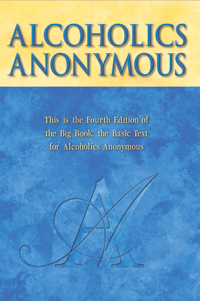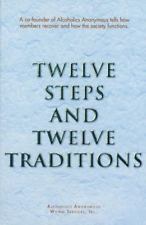


Dependence on God is always positive, and is an antidote for self-will and self-reliance . Dependence on individuals is nearly always negative.
The 12 & 12 adds dependence on AA itself as another healthy form of dependence. |
 |
"The minute we put our work on a service plane, the alcoholic commences to rely upon our assistance rather than upon God. He clamors for this or that, claiming he cannot master alcohol until his material needs are care d for. Nonsense. Some of us have taken very hard knocks to learn this truth: Job or no job--wife or no wife--we simply do not stop drinking so long as we place dependence upon other people ahead of dependence on God.
"Burn this idea into the consciousness of every man that he can get well regardless of anyone. The only condition is that he trust in God and clean house."
Page 98, Working With Others
"Let no alcoholic say he cannot recover unless he has his family back. This just isn't so. In some cases the wife will never come back for one reason or another.
Remind the prospect that his recovery is not dependent upon people. It is dependent upon his relationship with God."
Page 99-100, Working With Others
"When we look back, we realize that the things which came to us when we put
ourselves in God's hands were better than anything we could have planned. Follow the dictates of a Higher Power and you will presently live in a new and wonderful world, no matter what your present circumstances!"
Page 100, Working With Others
12 & 12:
"But suppose that instinct still cries out, as it certainly will, 'Yes,
respecting alcohol, I guess I [reluctant newcomer] have to be dependent upon A.A., but in all other matters I must still maintain my independence'... The more we become willing to depend upon a Higher Power, the more independent we actually are. Therefore dependence, as A.A.
practices it, is really a means of gaining true independence of the spirit."
Page 35-6, Step Three
"Let's examine for a moment this idea of dependence at the level of everyday living. In this area it is startling to discover how dependent we really are, and how unconscious of that dependence. Every modern house has electric wiring carrying power and light to its interior. We are delighted with this dependence; our main hope is that nothing will ever cut off the supply of current. By so accepting our dependence upon this marvel of science, we find ourselves more independent personally... Ask the polio sufferer confined to an iron lung who depends with complete trust upon a motor to keep the breath of life in him.
"But the moment our mental or emotional independence is in question, how
differently we behave... Nobody is going to meddle with our personal independence in such matters. Besides, we think, there is no one we can surely trust. We are certain that our intelligence, backed by willpower, can rightly control our inner lives and guarantee us success in the world we live in."
Page 36-7, Step Three
"We realize that the word "dependence" is as distasteful to many psychiatrists
and psychologists as it is to alcoholics. Like our professional friends, we,
too, are aware that there are wrong forms of dependence. We have experienced
many of them. No adult man or woman, for example, should be in too much
emotional dependence upon a parent. They should have been weaned long before,
and if they have not been, they should wake up to the fact. This very form of
faulty dependence has caused many a rebellious alcoholic to conclude that
dependence of any sort must be intolerably damaging. But dependence upon an
A.A. group or upon a Higher Power hasn't produced any baleful results."
Page 38, Step Three
"Would the kind of dependence they [AA's in the military during WW II] had learned in A.A. carry them through? Well, it did... Whether in Alaska or on the Salerno beachhead,
their dependence upon a Higher Power worked. And far from being a weakness,
this dependence was their chief source of strength.
Page 38-9, Step Three
"His lone courage and unaided will cannot do it. Surely he must now depend upon Somebody or Something else.
"At first that 'somebody' is likely to be his closest A.A. friend."
Page 39, Step Three (short-term human reliance for beginners only is endorsed here)
"Nor is the quest for security always expressed in terms of money. How
frequently we see a frightened human being determined to depend completely upon
a stronger person for guidance and protection. This weak one, failing to meet
life's responsibilities with his own resources, never grows up."
Page 43, Step Four
"The primary fact that we fail to recognize is our
total inability to form a true partnership with another human being. Our
egomania digs two disastrous pitfalls. Either we insist upon dominating the
people we know, or we depend upon them far too much."
Page 53, Step Four
"Our demand for emotional security, for our own way, had constantly thrown us into unworkable relations with other people. Though we were sometimes quite unconscious of this, the result always had been the same. Either we had tried to play God and dominate those about us, or we had insisted on being overdependent upon them."
"We had refused to learn the very hard lesson that overdependence upon people is unsuccessful because all people are fallible, and even the best of them will sometimes let us down, especially when our demands for attention become unreasonable."
Page 115, Step Twelve
"When we developed still more, we discovered the best possible source of
emotional stability to be God Himself. We found that dependence upon His
perfect justice, forgiveness, and love was healthy, and that it would work
where nothing else would. If we really depended upon God, we couldn't very well
play God to our fellows nor would we feel the urge wholly to rely on human
protection and care."
Page 116, Step Twelve
"For alcoholism had been a lonely business, even though we had been
surrounded by people who loved us. But when self-will had driven everybody away
and our isolation had become complete, it caused us to play the big shot in
cheap barrooms and then fare forth alone on the street to depend upon the
charity of passersby. We were still trying to find emotional security by being
dominating or dependent upon others. Even when our fortunes had not ebbed that
much and we nevertheless found ourselves alone in the world, we still vainly
tried to be secure by some unhealthy kind of domination or dependence."
Page 116-7, Step Twelve
"When a job still looked like a mere means of getting money rather than an opportunity for service, when the acquisition of money for financial independence looked more important than a right dependence upon God, we were still the victims of
unreasonable fears."
Page 121, Step Twelve
Related:
Big Book:
"Frothy emotional appeal seldom suffices. The message which can interest and hold these alcoholic people must have depth and weight. In nearly all cases, their ideals
must be grounded in a power greater than themselves, if they are to re-create their lives."
The Doctor's Opinion
12 & 12:
"No man, we saw, could believe in God and defy Him, too. Belief meant reliance, not; defiance. In A.A, we saw the fruits of this belief: men and women spared from alcohol's final catastrophe."
Page 31, Step Two
"So how, exactly, can the willing person continue to turn his will and his life
over to the Higher Power? He made a beginning, we have seen, when he commenced
to rely upon A.A. for the solution of his alcohol problem."
Page 39, Step Three